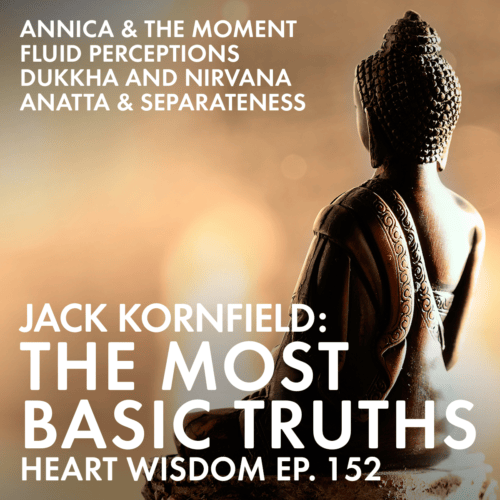
In this episode of Heart Wisdom, Jack Kornfield blesses us with a dharma talk on the most basic truths in Buddhism: Annica, Dukkha, and Anatta.
Annica and the Present Moment
Before getting into the discussion, Jack Kornfield reads us the poem In the World by Brigid Lowry. The poem highlights a theme of community. It beautifully articulates how humans are interconnected through both pain and beauty, with the natural world and with each other. Jack tells us that sitting peacefully and seeing the way things are, whether pleasant or unpleasant, brings us to liberation. In Buddhism, this concept of transience is called Annica. Knowing that all things are ever-changing and passing by allows us to appreciate the present moment.
“Because everything is changing, the more you cling and hold on, the more you suffer.” – Jack Kornfield
Fluid Perceptions (10:01)
Jack tells us about a common psychological experiment wherein students touch buckets of water at varying temperatures. For the hand that was just in very hot water, the mildly warm water feels cool. For the hand in frigidly cold water, the mildly warm water feels hot. This goes to show that our perceptions may not always be accurate to reality. This does not make them less valid for our experience, but it is proof that we should not judge others for feeling differently than we do. In addition, our views often change as we grow and learn. Feelings and perceptions are just more examples of impermanence. The more we evolve, the more we can practice acceptance without imposing on the moment and on others.
“As we become wise, we step back and see the mystery of it instead of how it is supposed to be.” – Jack Kornfield
Tune into Ep. 97 of Insight Hour for more on perception: Perception & Mental Formations
Dukkha and Nirvana (26:36)
We move on to discuss Dukkha, the Buddhist concept of suffering. Jack says that war, disease, and climate change, are all examples of Dukkha. There is the Dukkha of change, the Dukkha of pain, and the Dukkha of duality / the nature of things. We may not be able to act upon suffering and change it, but we can open our hearts. Grief can become a doorway to Nirvana when we learn to sit with it and quiet our minds.
“When you realize the fact that everything changes, and find your composure in it, there you find yourself in Nirvana. Nirvana is not someplace else, it is the freedom and the peace that is available to you with a quiet mind and an open heart.” – Jack Kornfield quoting Zen Master Suzuki Roshi
To practice sitting with your Dukkha, mediate along with us in Ep. 66 of Healing at the Edge: Compassion for All Suffering
Anatta and the Fiction of Separateness (45:02)
Anatta is the concept of non-self. Often, people get stuck in the self and the fiction of separateness. However, we are all a part of the wheel of life. Jack says that we are not really ourselves, we are the entire chain of being. Just like how an apple comes from a tree, from a rhizome and the sun, we too are interwoven into a collective existence. We are all loving awareness. Jack shares a story of Ram Dass in his final years. He was sick, paralyzed, and oftentimes had physical traumas such as bed sores, but he was still joyful. Jack asked him how he could remain so happy, to which Ram Dass replied that he is awareness and he loves it all.
“There is a kind of joy that comes when we see with the eyes of wisdom, the great heart of compassion, and trust.” – Jack Kornfield

Photo via Firnthirith

